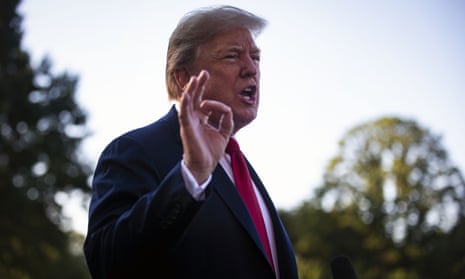Under fire over his administration’s failure to meet a court-ordered deadline to reunite parents with the youngest children taken away under his “zero tolerance” immigration policy, Donald Trump reacted with familiar defiance.
As of Monday night, the Department of Justice (DoJ) had only managed to reunite families with two of 102 migrant children under five who were taken at the southern border. Officials said they expected to reunite another 54 children on Tuesday.
Speaking outside the White House before flying to Europe, Trump said: “Well, I have a solution. Tell people not to come to our country illegally. That’s the solution. Don’t come to our country illegally. Come like other people do. Come legally.”
Pressed on whether his “solution” was to punish children for being brought to the US illegally by adults, Trump retreated to more general comments.
“We have laws. We have borders. Don’t come to our country illegally,” he said. “We want no crime, and we want borders where borders mean something. And remember this: without borders, you do not have a country.”
On 26 June, federal judge Dana Sabraw granted a preliminary injunction requiring the reunification of children under the age of five by 10 July. On Monday, officials told Sabraw they would not be able to meet that deadline. The administration has until 26 July to reunite all of the more than 2,000 children who were separated from parents this spring and summer.
Under the “zero-tolerance”, policy, while parents entering the US illegally were held for prosecution, children were placed in Department of Health and Human Services (HSS) facilities across the country. Previously, families were in most cases held together.
Amid enormous backlash and international outcry, Trump reversed course on 20 June and said families should remain together until the parents’ immigration proceedings are complete, a process that can take months.
On Monday night, though, the administration lost in an attempt to overturn a 1997 court precedent that says minors cannot be held for more than 20 days. That judge also denied a request to suspend requirements that immigrant children be held only in facilities that meet state child welfare licensing regulations.
The injunction to reunite families came as a result of an American Civil Liberties Union (ACLU) lawsuit.
Lee Gelernt, deputy director of the ACLU’s Immigrants’ Rights Project, said: “The court is holding the Trump administration’s feet to the fire to get these kids reunited with their parents. That’s the most important thing.
“It’s extremely disappointing the government will not be in full compliance with the court order, but the judge has stepped in to manage this mess of the administration’s making.”
Sabraw said on Monday he was “very encouraged with the progress” made so far, but declined to issue a blanket extension to the administration, instead asking for a detailed list of reasons for each case in which the government had failed to reunite a young child with his or her family.
The DoJ argued there were a number of reasons for the delay. Some children were brought to the US by someone who was not their biological parent, it said, adding that others had parents with serious criminal records.
According to the DoJ, 12 children under five have parents either in local or federal criminal detention who must serve time before being transferred to the custody of the Immigration and Customs Enforcement (Ice), a law enforcement agency within the Department of Homeland Security. Another 18 have parents who were lost by the administration after their deportation or released into the US.
Without separations or family detention, the government has few options besides allowing families to pursue immigration claims “at liberty” – as prior administrations have generally done. Trump has repeatedly decried this practice as “catch and release”.
